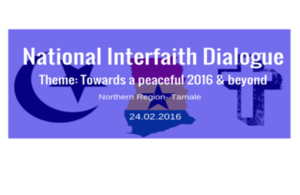National Interfaith Dialogue: Towards a peaceful 2016 and beyond
British High Commission collaborates with Religious Leaders to host a National Interfaith Dialogue in Tamale.

Interfaith Dialogue
The British High Commission Accra in partnership with the National Peace Council, the Office of the National Chief Imam, the Christian community brings you an Interfaith Dialogue themed: “Towards a Peaceful 2016 and beyond”. The event will be held at the Radash hotel in Tamale on Wednesday 24th February 2016, and will host 250 invited guests. Representatives from religious, traditional and community leaders Include: Political party representatives, The National Peace Council, The Ghana Pentecostal and Charismatic Council, Catholic Bishops’ Conference, National Chief Imam’s Office, and representatives of the University of Development Studies.
Religious intolerance is a global phenomenon and is one of the major causes of intra- and inter-religious conflicts. In Ghana, there has been an appreciable level of harmony between the major faith groups; Christians and Muslims. However, there have been occasional instances of violence in Kumasi, Sekondi, Takoradi, Wa and Wenchi; memories of the Catholic-Muslims clash in Tamale as well as last year’s demonstration by Muslim students in the Western Region following the ban on the wearing of the hijab in schools, the recent Christian Council of Ghana and the National Chief Imam clash over the Gitmo ex- convicts residing in Ghana. Worldwide occurrences of religious extremism cannot be ignored and the emergence of Boko Haram in Nigeria and other religious clashes in the region have further become a potential threat to Ghana’s peace and stability. Religious extremism has not established roots in Ghana however, the current interfaith relations within Ghana is under some degree of strain and therefore needs constant nourishment.
The National Interfaith Dialogue involving religious leaders as well as some key political stakeholders will aim:
• To encourage religious groups to understand and respect the traditions and distinctiveness of each other; removing religious prejudices and stereotypes which create fear and suspicion as well as discrimination and exclusion among religious communities;
• To sensitize grass-root adherents of different faiths about concepts, traditions, beliefs and values in different religions.
• To coalesce public opinion against religious fanaticism, extremism and terrorism.
• To encourage peaceful interfaith co-existence before, during and after the 2016 general elections.
Key outcomes of the meeting will see religious, traditional and community leaders renew commitments to advocate a culture of religious tolerance and non- violence amongst their patrons and in their respective communities. Long term objectives include developing a model based on the success of religious tolerance in Ghana, which can be further exported to countries in the region. Political party leaders will be further asked to pledge their commitment to support a violent free election process in November 2016 and beyond.
For further information please contact:
Laila Lipede
Political Officer
Public and Political Affairs
British High Commission Accra Tel: +233(0) 302 212214
Email: Laila.Lipede@fco.gov.uk